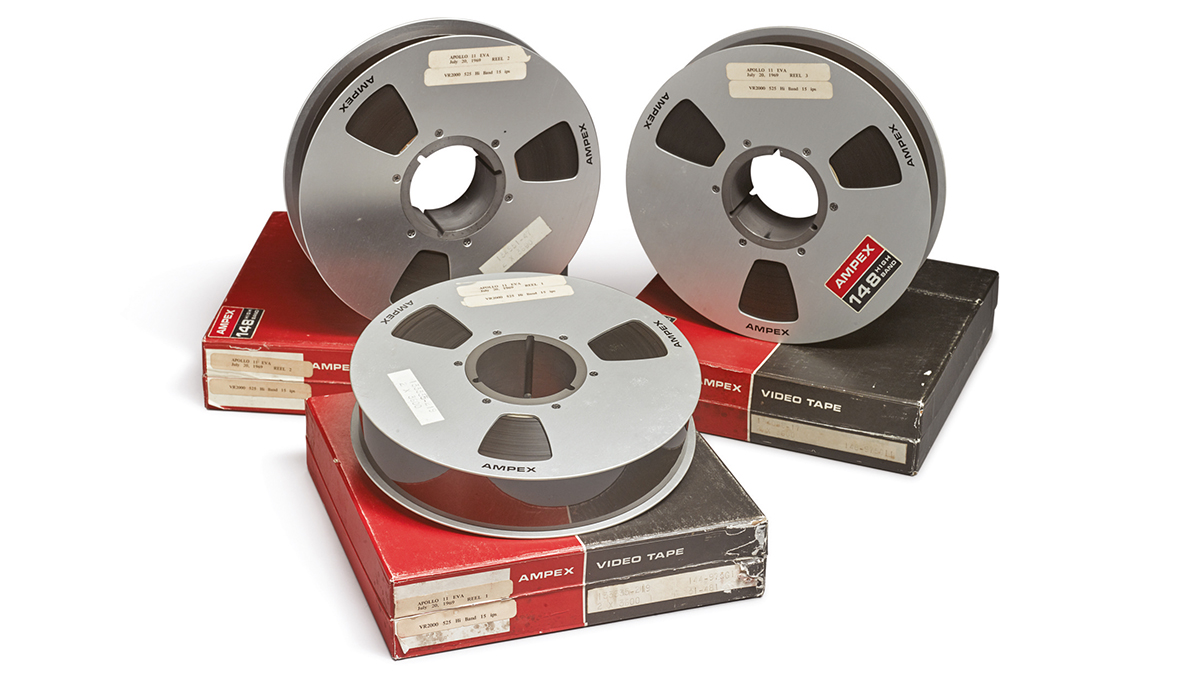NASA Addresses Controversy Over 'Lost Tapes' of Apollo 11 Moonwalk
The agency dismissed claims that it had lost footage of the first moonwalk.
As a former one-time NASA intern prepares to auction off videotapes that allegedly contain original recordings of the first moonwalk, NASA released a statement addressing claims that the agency lost the footage from the Apollo 11 mission.
The search for the "lost tapes" began in 2006, when reports began surfacing that NASA had erased some original footage from the first moon landing. The agency conducted an intensive search at the time, but could not find the tapes.
"An intensive search of archives and records concluded that the most likely scenario was that the program managers determined there was no longer a need to keep the tapes — since all the video was recorded elsewhere — and they were erased and reused," NASA officials said in the statement.
Related: Watch NASA's Apollo 11 Moonwalk Moments in This Archive Video

However, NASA reaffirmed that there is no missing footage from Apollo 11 since the video transmissions were relayed to the Manned Spacecraft Center (now known as Johnson Space Center) in Houston during the mission, according to the statement. Video from those tapes was converted to a format which could be broadcast on television.
The footage was recorded in slow scan, meaning that it had an output of 10 frames per second; therefore, it could not be directly broadcast on television. According to NASA, the footage was converted for broadcast and uplinked to a satellite, then downlinked to Houston before it appeared on commercial television.
The agency restored the footage and released it in 2009 for the 40th anniversary of the Apollo 11 moon mission.
Get the Space.com Newsletter
Breaking space news, the latest updates on rocket launches, skywatching events and more!
"There was no video that came down slow scan that was not converted live, fed live, to Houston and fed live to the world," NASA engineer Dick Nafzger, who led the search for the footage, said at a news briefing about the lost tapes in 2009. "So, just in case anyone thinks there is video out there that hasn’t been seen, that is not the case."
Gary George, a 65-year-old mechanical engineer who was a young college student at the time of his internship at NASA, bought the tapes at a government surplus auction in 1976 for a little over $200, according to the description of the auctioned item on Sotheby's.
The item consists of three metal reels of Ampex 148 High Band 2-inch Quadruplex videotape, each between 45 and 50 minutes in length.
NASA is aware that some of the moonwalk tapes are up for sale this year.
"In 2019, a one-time NASA intern is selling what he describes as videotapes of the Apollo 11 moonwalk that he bought at an auction of surplus government goods," NASA officials said in a statement. "If the tapes are as described in the sale material, they are 2-inch videotapes recorded in Houston from the video that had been converted to a format that could be broadcast over commercial television and contain no material that hasn't been preserved at NASA."
So, NASA technically hasn't lost any of the Apollo footage — only the original tapes with that footage.
George's Apollo tapes are expected to sell for $1-2 million on the upcoming 50th anniversary of Apollo 11.
The live auction will begin on July 20 at 11 am EDT.
Editor's note: An earlier version of this story misstated that NASA had dismissed ownership claims of George's Apollo moonwalk tapes and their authenticity. This was incorrect, as NASA stated that the footage on the tapes was already preserved by the agency. This story has been corrected to reflect that.
- NASA Erased First Moonwalk Tapes, But Restores Copies
- First Moonwalker Neil Armstrong's Memorabilia Heads to Auction
- Will Apollo Nostalgia Help NASA Get Its Artemis Moon Money?
Follow Passant Rabie on Twitter @passantrabie. Follow us on Twitter @Spacedotcom and on Facebook.
Join our Space Forums to keep talking space on the latest missions, night sky and more! And if you have a news tip, correction or comment, let us know at: community@space.com.

Passant Rabie is an award-winning journalist from Cairo, Egypt. Rabie moved to New York to pursue a master's degree in science journalism at New York University. She developed a strong passion for all things space, and guiding readers through the mysteries of the local universe. Rabie covers ongoing missions to distant planets and beyond, and breaks down recent discoveries in the world of astrophysics and the latest in ongoing space news. Prior to moving to New York, she spent years writing for independent media outlets across the Middle East and aims to produce accurate coverage of science stories within a regional context.
